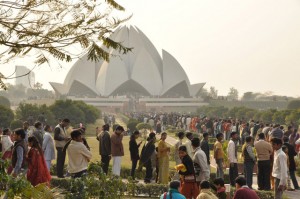The views expressed in our content reflect individual perspectives and do not represent the authoritative views of the Baha'i Faith.
If you’ve read the essays here at BahaiTeachings.org for a while, you’ve probably realized that the Baha’i Faith is a very active religion, not a passive one.
Baha’u’llah did not look upon the peoples of the world as passive recipients of God’s guidance. Instead, he treated us as empowered participants in the process of creating a better existence for all of humanity. Even the way he addresses his readers bears this out.
In many of his later writings Baha’u’llah gave some of his teachings in a form never before seen in any of the sacred literature of Islam, Christianity, or Judaism: rather than stating a particular action he wished his followers to perform, he outlined broad goals and asked us to take whatever steps might lead to attaining them. He left it up to us—to our intelligence, our creativity and our love for others—to figure it out.
Three examples from Baha’u’llah’s writings illustrate this unique pattern.
They who are the people of God must, with fixed resolve and perfect confidence, keep their eyes directed towards the Day Spring of Glory, and be busied in whatever may be conducive to the betterment of the world and the education of its peoples. – Gleanings from the Writings of Baha’u’llah, p. 270.
In this Day whatsoever serveth to reduce blindness and to increase vision is worthy of consideration. This vision acteth as the agent and guide for true knowledge. – Tablets of Baha’u’llah Revealed After the Kitab-i-Aqdas, p. 35.
In this glorious Day whatsoever can purge you from defilement and ensure your peace and tranquility, that indeed is the straight Path, the Path that leadeth unto Me. – The Tabernacle of Unity, p. 5.
Baha’u’llah’s revelation is vast, its themes virtually inexhaustible—just like our modern world. That opens up thousands of ways to apply God’s teachings to specific situations. This fact makes the form of Baha’u’llah’s teachings so thought-provoking. Anyone, in any context, can draw insight from Baha’u’llah’s guidance. Beyond passages like the ones above, his body of writings contains a degree of openness and applicability that allows people in diverse settings to apply them intelligently to their own circumstances.
The betterment of the world, the education of its peoples, an increase in vision, peace, and tranquility; these themes and general guideposts lend meaning and direction to our lives, even though they provide little detailed content. That, in many ways, exemplifies the Baha’i message: God trusts us to figure out the specifics for ourselves. This one primary difference sets the spirit of the Baha’i Faith apart from the passive traditionalism that still seems common in the religious life of humanity.
So what does it mean to practice Baha’u’llah’s teachings today? To a large extent, it simply means to participate in the process of community-building happening in Baha’i communities around the world. In this way, Baha’is try to fill the open space traced by Baha’u’llah’s commandments.

In the past two decades, four kinds of activity have become intense focal points for the practice of the Baha’i teachings: Classes for the spiritual education of children, groups for the spiritual empowerment of early adolescents, gatherings for prayer and worship, and study circles for exploring reality in light of the Baha’i teachings. Baha’u’llah’s writings didn’t specifically mention any of these activities. Each of them has evolved over time as individuals, communities, and institutions have striven to more effectively embody Baha’u’llah’s broad, unified vision for the future of humanity.
Because nothing about this framework has remained static, it tends to turn its participants into active contributors to its own ongoing development. For that reason, a tangible change in culture has begun to occur. Baha’i institutions, especially the Universal House of Justice, the democratically-elected body that administers the global Baha’i community, have engaged individuals in a process that regularly evaluates, modifies and improves the activities happening in local communities. Baha’is take time to analyze their community-building experience, consult about what does and doesn’t work, make plans of action that draw on that learning, and celebrate what we’ve already accomplished. Participants think more and more not only about how they can contribute to social progress, but also how they can apply their intelligence to enhance the quality and quantity of their active outreach to others.
Consequently, a growing number of people, Baha’is and their friends and neighbors, have learned to see themselves as co-creators of a worldwide grassroots engine for spiritual and social change. Adopting that open, inclusive point of view can transform religion into something that empowers.
















Comments
Sign in or create an account
Continue with Googleor